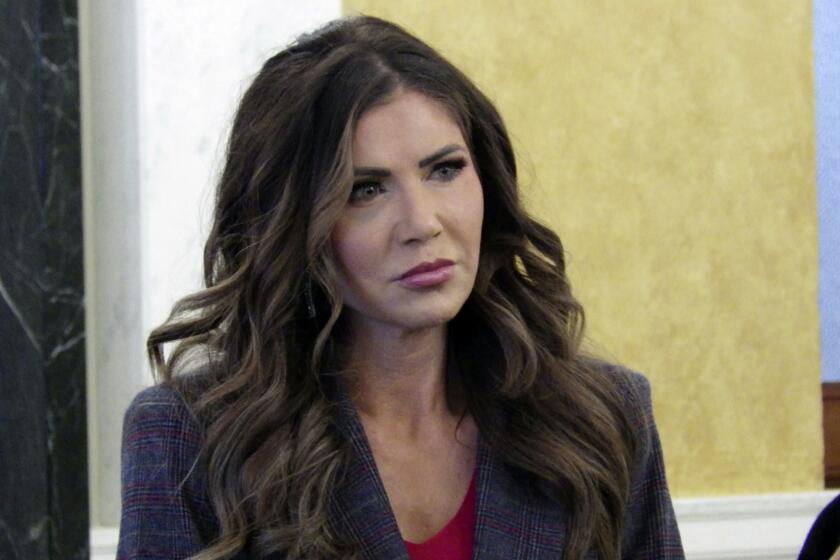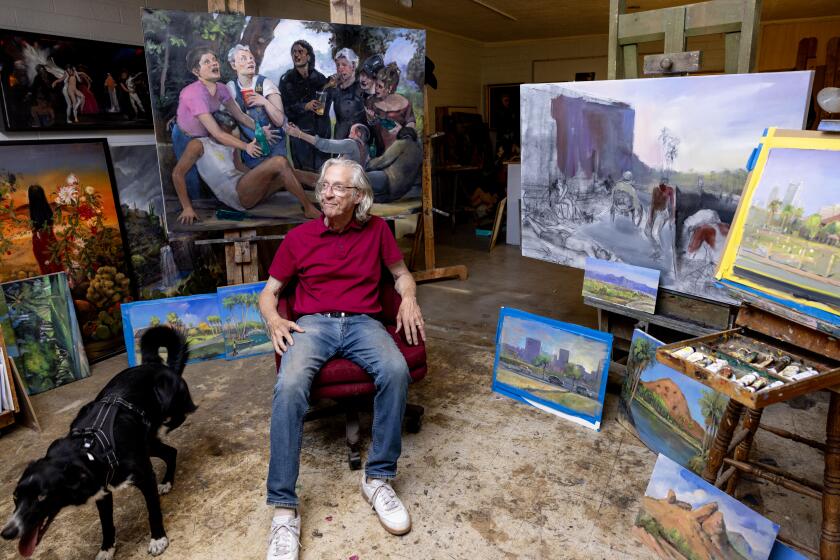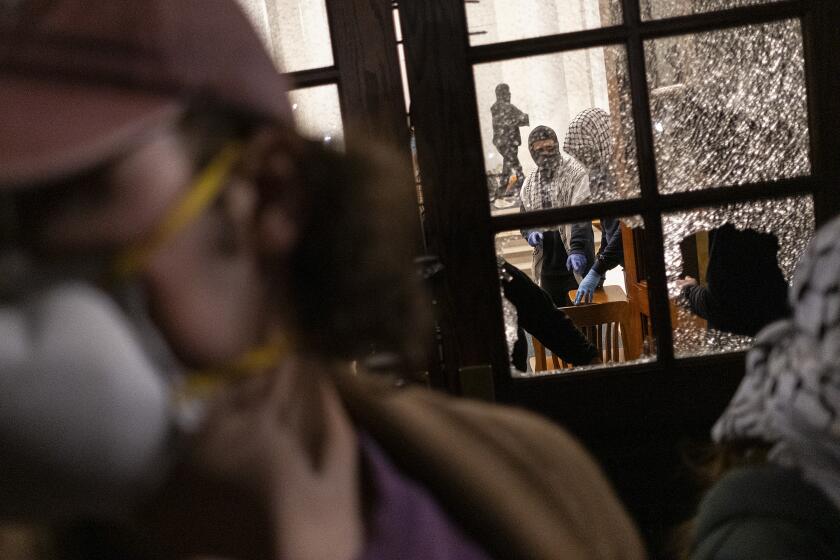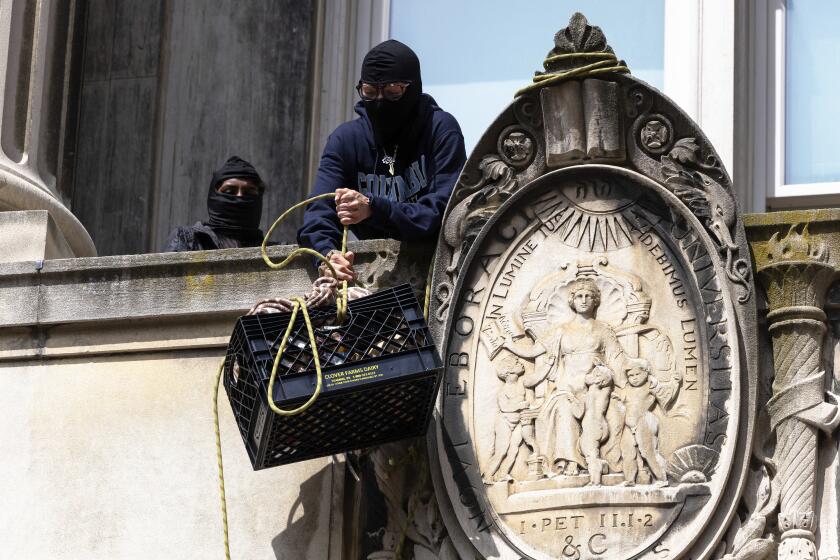Rookies, Pros Mesh in Clark’s First Campaign
There was the Harvard-educated actress, sitting not far from the British journalist, just across from the former manager of a Washington restaurant, down the way from a dot-com millionaire who, at 34, had come out of retirement to work -- like the others -- in a key position at Wesley K. Clark’s presidential campaign headquarters.
None has previous political experience. Some toil for free.
As presidential campaigns have grown into ventures costing tens of millions of dollars, top slots have largely become the domain of high-priced professional strategists. And Democratic hopeful Clark has plenty of pros working out of offices at the Little Rock train station.
But in launching his candidacy about three months ago, the former four-star general was at first forced to rely heavily on amateurs -- possibly one reason for his halting start. However, as the campaign has settled into its hectic rhythm, Clark has decided to keep many of the newcomers and has come to count on operatives with no political background.
These are not the wide-eyed youngsters who flood all presidential campaigns, although Clark has those too. Rather, they are relatively senior aides -- most are in their 30s and 40s -- who have had careers in other arenas but took leaves of absence, or quit, to sign on with Clark.
“I’m a selfish New Yorker, and I was happy drinking my martinis and hanging out at Pravda, or whatever the latest hip club was,” said Maya Israel, 35, the actress. She has appeared on several TV shows, including “Law & Order” and “Third Watch,” is co-director of an art gallery and worked in public relations. Then she lost two friends in the attacks on the World Trade Center. Unhappy with President Bush’s ensuing foreign policy, Israel joined the Internet-driven effort to draft Clark into the race and is now an associate director of communications for him.
“I think the campaign made a conscious choice -- I know the general did -- to try this experiment of putting people with diverse backgrounds together with experienced political hands,” she said.
The newcomers “think out of the box because we’ve never thought in the box,” Israel added.
Having entered the race late, Clark has been forced to build his staff, refine his message, raise money and develop policy papers even as he travels the country campaigning against rivals who have been stumping for more than a year. Given that, the campaign figured, it would make no sense to turn away someone like Peter Stevenson.
Stevenson, a British citizen, became impressed by Clark’s opinion articles while working as a writer and editor on the foreign desk at the Times of London. When Clark announced his candidacy, Stevenson quit and moved to Little Rock, where he works on Clark’s radio appearances and ads.
“People in Europe rant and rave about Bush without understanding American domestic politics,” said Stevenson, who at 24 is one of the youngest of the ranking newcomers. “It’s not my place to criticize the American president. But I think Clark would be a better president. And this is a great opportunity for me to learn.
“I’m not getting paid,” he added, “so I’ll stay on until my money runs out.”
Senior Communication Counselor Chris Lehane, whose political resume includes working as press secretary for Al Gore’s 2000 campaign, said: “This is the most fun I’ve ever had on a campaign. Because of [Clark’s] background, he has managed to attract people with an incredible diversity of talent.”
One of them is Lehane’s wife, Andrea Evans, 34, a San Francisco-based, white-collar criminal defense attorney who had never joined any political campaign.
She was first asked if she would consider helping out before Clark had announced his candidacy and while her husband was working for Massachusetts Sen. John F. Kerry, a post he left in early September.
When Clark joined the race, she left her duties defending former Enron Chief Financial Officer Andrew S. Fastow on fraud and other charges -- a man, and company, Clark and many of the other Democratic contenders love to lambaste in their speeches.
“This is not a [new] career,” said Evans, an associate communications director. “People are here because they are jazzed up about this candidate. I know this is a one-time thing. I don’t want to do it again, and a lot of people here are like that.”
Placing political amateurs in key slots has had its drawbacks. New advance people, for instance, have not realized that Clark would need a light at his lectern when delivering speeches in darkened rooms, Evans said.
Michael Sean Winters had no inkling of how to write a news release when he showed up. He had penned numerous articles on the Roman Catholic Church for such publications as The New Republic, but the only “real job” he’d had was at D.C. landmark Kramerbooks & Afterwords, where, as restaurant manager, he hired refugees from the Balkan wars during the 1990s.
As commander of NATO forces, Clark led the bombing campaign that ended the ethnic strife in Kosovo.
“Many of the people I hired, or someone in their family, would be dead” had the war continued, the 41-year-old Winters said. “When [Clark] announced, I quit my job, took out a second mortgage on my house and came down here. I’m budgeted through Jan. 1 for my mortgage and 10 dinner parties.”
Early on, tensions arose both between the political pros and the newcomers, as well as among various factions of the draft-Clark movement, staffers acknowledge. They have largely been laid to rest, most agree, by several of the old pros, notably campaign Chairman Eli Segal.
A former aide to President Clinton, Segal has not only encouraged the veterans to tap into the expertise of the newcomers, according to staffers, but he also has made sure the neophytes go to key meetings, where their ideas receive serious consideration.
Eric Carbone, the campaign’s Web producer, retired in 2001 at age 32 after selling a sports-related Web site to AOL. He worked on one of the Web sites devoted to drafting Clark, and when the ex-general announced his candidacy, he had the first official site up and running in 18 hours.
Like others, he compares the feel of the campaign to the hey-day of the dot-coms, with staffers working until the wee hours and blessed by a certain ignorance. “We didn’t know what we didn’t know, didn’t know what we couldn’t do, so we just did it,” Carbone said. “That naivete worked then, and this has the same vibe.”
As the campaign has raised more money, it has hired more political professionals. Some came from Florida Sen. Bob Graham’s failed candidacy, many with political links to Clinton and Gore, including Communications Director Matt Bennett, National Press Secretary Bill Buck and Policy Director Jason Furman.
Clark and his professionals, however, have decided that what began as a grass-roots effort might do well in retaining some of that character.
So, on the far side of the office from Carbone, Murat Armbruster, 35, who made his fortune with an online education company, works on campaign logistics.
Mike Davis, 57, who spent 30 years as an archeologist in Texas, is organizing caravans of Clark supporters to travel to early primary states. Keti Esquivel, 28, who quit her human resources post at Kodak, is organizing Latino outreach.
Clark “knew we were rookies,” Carbone said. “And if you asked me three months ago if I thought I’d be on the senior staff of a presidential campaign, I’d have laughed in your face.
“But I think the general also believed we would bring an energy and a different feel to the campaign. And I think it’s working.”
More to Read
Get the L.A. Times Politics newsletter
Deeply reported insights into legislation, politics and policy from Sacramento, Washington and beyond. In your inbox three times per week.
You may occasionally receive promotional content from the Los Angeles Times.






